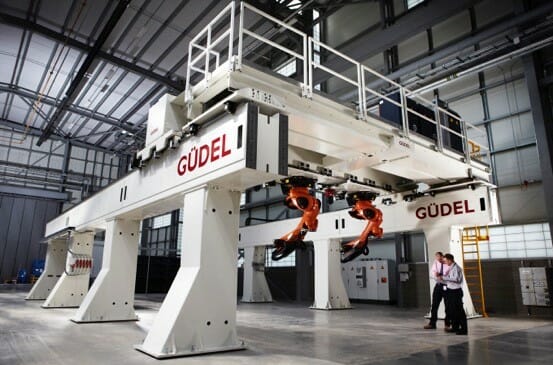Wendy McManus: What is your view on the state of the robotics sector in the UK?
Troy McCourt: It is common knowledge that the UK has continued to lag behind other industrial nations in the uptake of robotics, and this stance has had a negative effect on the UK’s productivity as a whole. The future however does look more promising as manufacturers now realise not only the need but also the urgency with which we have to automate because of the benefits that automation and robotics in particular can bring. This is all brought into perspective by the statistics for UK robot population, outside of the automotive sector, per 10,000 employees. The UK figure is just 39 whereas Germany boasts an impressive 181. Over 4 times that of the UK, so clearly we have some catching up to do!
Wendy McManus: Can you tell me what differentiates Gantry Robots from other robot types?
Troy McCourt: As you know, robots come in all shapes and sizes ranging from small SCARA types through sophisticated 6 axis systems to gantry robots. The limitation, if we can call it that, of articulated arm robots is that they have a fixed configuration. That is they have a pre-determined reach and work envelope. The main advantage of the gantry robot is the capability to address large or unusual working envelopes.
There are several major features that differentiate Gantry robots. One is the ability to span great areas, but with a minimal footprint. A Gantry Robot can easily work over the top of a number of machine tools without impacting on the access to those machines, and with just a small footprint for the support sections. Another is the ability to configure the system to meet the exact needs of the application. We have supplied Gantry Robot Systems up to 100 metres in length. Also, the rigidity of Güdel Gantry Robots allows them to handle large payloads, but still match the accuracy and repeatability of other robot types.
Wendy McManus: Are there specific industry sectors where Gantry Robots are more suited?
Troy McCourt: Due to their different configuration, gantries are a niche solution, so almost all sectors have applications where a Gantry robot is the best solution. Güdel has supplied Gantry Robots into the Automotive, Aerospace, Nuclear, Logistics, Food, Rail, Energy and Tyre industries for a wide variety of applications. As I mentioned before, the ability to be able to tailor a Gantry Robot to the specific application means that they are suited to certain applications in all industries. New application areas emerge all the time, and Güdel is currently active within the Modular Building sector, where we have Gantry robots producing items such as roof trusses and wall panels, and in other parts of the world Gudel gantries are even being used for 3D concrete printing of modular housing.
Wendy McManus: You mention that Gantry Robots are suited to all industry sectors, can you give an example of one of the most innovative applications you have been involved with?
Troy McCourt: Yes, for example, Güdel Gantry robots are an integral part of the production systems for the A380 aircraft wing Outer Rear Spar, transporting the specialist tooling systems used to produce the multitude of holes on each component. In another of the more unusual applications, a 5 axis Güdel Gantry system uses a 1.0m diameter wheel, combined with force monitoring, to create a highly polished mirror finish on aircraft fuselage sections. The capability of the Gantry robot to span great distances, makes them the perfect solution for these applications.
Wendy McManus: You mention that Gantry Robots are suited to all industry sectors, can you give an example of one of the most innovative applications you have been involved with?
Troy McCourt: Yes, for example, Güdel Gantry robots are an integral part of the production systems for the A380 aircraft wing Outer Rear Spar, transporting the specialist tooling systems used to produce the multitude of holes on each component. In another of the more unusual applications, a 5 axis Güdel Gantry system uses a 1.0m diameter wheel, combined with force monitoring, to create a highly polished mirror finish on aircraft fuselage sections. The capability of the Gantry robot to span great distances, makes them the perfect solution for these applications.
Wendy McManus: Finally, how is Güdel placed to meet future market challenges?
Troy McCourt: Güdel is a Swiss family owned business with a heritage spanning 3 generations. Today the company has over 1,200 employees, a presence in 30 locations worldwide, and an enviable reputation as a supplier of high precision machine components and intelligent automation solutions. With credentials such as these, plus a philosophy of ongoing technical innovation, Güdel is well placed to take advantage of the many opportunities for automation which the future holds.








